J.D. Porter's Blog
September 24, 2025
Dear Oliver – My Snoozing Buddy
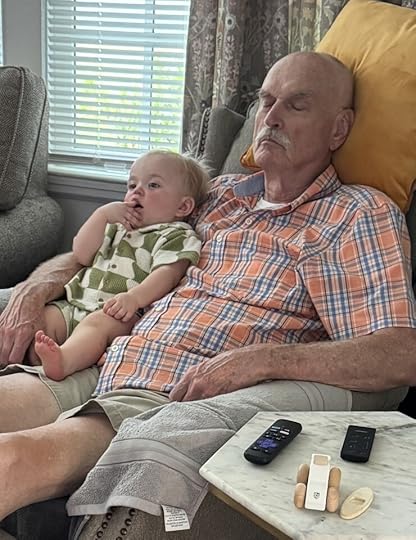
You and I share a daily habit. We both start getting cranky and out-of-sorts shortly after lunch every day. It’s time for our naps. You have been taking naps since the day you were born. I stopped taking naps during my school and working life, but started again after I retired from my job, about ten years ago. When I was working, I found it amusing—perhaps even childish—that my dad would head to the bedroom every afternoon for his nap. But it turns out, dad was in good company.
Famous adult nappers include writers, artists, philosophers, inventors, statesmen, and generals—some of whom are quoted as saying: “The replenishing thing that comes with a nap – you end up with two mornings in a day.” “I count it as an absolute certainty that in paradise, everyone naps. A nap can offer a glimpse into a twilight nether world where gods play, and dreams happen.” “Reading and naps, two of life’s greatest pleasures, go especially well together.”
Until recently, you took two naps every day, one in the morning and one in the afternoon. Now you only take one nap a day. Reducing your naps to once daily seems to be a part of your growing process—like no more formula and baby bottles, eating solid food, and walking and talking. I’m not sure why reducing naps is considered progress, except that it might help you sleep better at night.
When it is time for your nap you let us know by yawning and rubbing your eyes. So, we find a quiet space for you in the bedroom. As for me, I prefer to lay on the screen porch where I can watch the birds and butterflies flitting around the garden and listen to the squirrels and chipmunks fussing at some perceived threat. I might even compose an essay like this one in my head while I soak in the atmosphere and drift off to sleep.
According to Sleepdoctor.com, there are several types of Naps. Short naps typically last about 15 or 20 minutes while longer naps may last an hour or more. Both can be effective, but experts tend to recommend shorter naps. Sleep too long and you might wake up groggy or disorientated.
Some naps even have names. A power nap, for example, is a brief nap, generally only lasting 10 to 20 minutes. People around the world take power naps to relieve daytime sleepiness and increase their productivity at work.
The recovery nap, or replacement nap, is a period of daytime sleep that’s meant to benefit people who didn’t sleep well the night before. Your parents might need a recovery nap after you had a bad night.
A person who works the night shift might take a proactive nap. This type of planned nap is typically longer than a power nap and can often last several hours.
My naps are called recreational naps because they just give me pleasure. I have no trouble sleeping at night, but I do start to drag late in the day. So, I enjoy my afternoon nap, just like my dad did.
As usual, my dad was way ahead of his time in recognizing what I just recently discovered from “modern” research. Dad must have known that naps increase alertness and may improve working memory, which is how the brain stores and manipulates information. Short daytime naps can have a positive effect on learning, can help us become more emotionally stable, and can improve our mood. Naps might even have positive effects on our immune systems, making us less likely to catch colds. British poet Lord Byron (who died over 200 years ago) said “Always nap when you can. It is cheap medicine.”
You don’t seem to mind your naps. When you are tired, you go down pretty easily for an hour or so. I suppose the day will come when you will fight it. And when you begin first grade, naps will no longer be part of your routine—perhaps for the rest of your life. That’s when you and I will part ways. I will still get cranky and out-of-sorts after lunch. So, I plan to follow the advice of that great philosopher, Winnie the Pooh, who said, “Let’s begin by taking a smallish nap or two.”
August 25, 2025
Dear Oliver – One Small Step
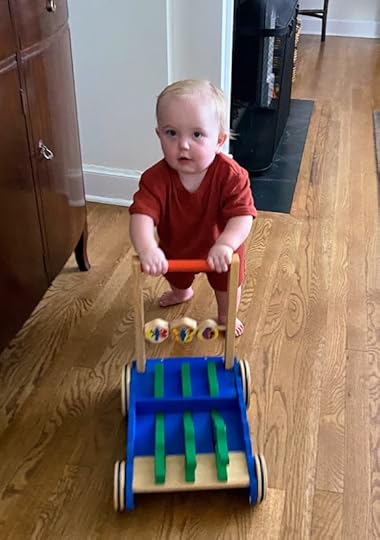
You started walking today. I saw it in a video from your daycare center. With encouragement from your teachers, you took 8 or 10 wobbly steps to get from a cabinet to a chair.
For weeks, we’ve watched you practice walking behind a wheeled push-toy that reminded me of my mom pushing her wheeled ‘rollator’ during her final days. Finally, at thirteen and a half months of age, you took your first, unassisted, I-need-to-get-there-by-myself steps. Now a whole world opens up to you—a lifetime of walking, ambling, strolling, sauntering, hiking, marching, and running.
That 1st step is a leap of faith for all of us. As minister and civil rights activist Martin Luther King, Jr said “Faith is taking the first step even when you can’t see the whole staircase.” Plenty of other famous people have commented on the importance of a single step. Chinese philosopher, Lao Tzu said, “A journey of a thousand miles must begin with a single step.” And before astronaut, Neil Armstrong stepped out of his spacecraft as the first man to set foot on the moon, he said, “One small step for a man, one giant leap for mankind.”
I love walking. It is good exercise, and I get to see interesting scenery, including flowers, birds, and wildlife. I come from a long line of walkers, although it skipped a generation with my parents. They didn’t walk much. But when my brothers and I spent weekends with Grandma Porter, she walked us all over St. Petersburg, Florida. We walked to the grocery store and drug store when she needed supplies. We walked to the ice cream shop after dinner. And we walked four blocks to the bus stop on Sixteenth Street when she needed to go downtown—where we walked some more.
Grandma Porter didn’t walk because it was good for her health. She wasn’t worried about her cardio workout or how many steps she got in. And she certainly didn’t walk for ‘fun’. She was just a walker. And so am I.
Author, Wayne Dyer says, “When you dance, your purpose is not to get to a place on the floor. It is to enjoy each step along the way.” That’s the way I feel about walking.
Now, you’ve taken your 1st steps on life’s journey. Enjoy the dance, Buddy. I look forward to our walks together.
August 20, 2025
Dear Oliver – On the Move (August 2025)
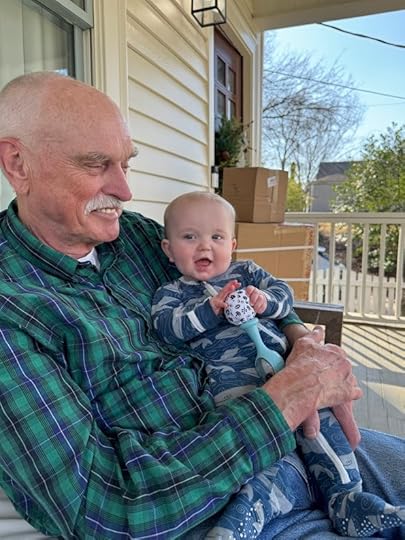
You don’t know it yet, but you will soon be living in a new house. Your parents have bought a home near me in Avondale Estates, so you will be leaving the home you were born into on Ridgedale Road in the Kirkwood neighborhood. I don’t think you will have any memories of that house, but you may wonder about it someday. Once again, our lives are on a parallel track.
When I was born, my parents lived with my dad’s mother. We lived with Grandma Porter for the first year or so of my life until we moved into the house that my brothers and I were raised in. I wrote about my grandma’s house in an article titled “Being Part of the ‘Village’” in my book, Roaming, Rambling, and Reminiscing, Musings from a South Georgia Mule Wagon.
I am happy that you are moving into my neighborhood because you will be living just a few blocks from my house. But I do have fond memories of being with you as a baby in Kirkwood—the walks around Bessie Branham Park, swinging in the bucket swings, and picking you up from the daycare behind Turner AME Church. But your memories will begin in Avondale Estates, and I can’t predict what those memories might be. All I know is, I look forward to being a part of them.
Love,
Grandpa
August 6, 2025
Dear Oliver – Carpe Diem
As I have been watching your growth and development, I have once again had to pause and reflect on my own life. You have helped me appreciate how precious every day is. Compared to you, my time is relatively short, so I need to make every day count. But, if I step inside your life, the same can be said for you. You have lived one full year of your life, and it has been momentous.
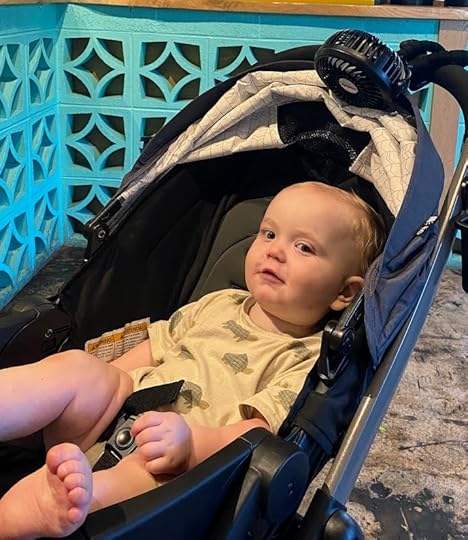
I suppose from your perspective, you are already making every day count. You don’t have any worries, yet. Those of us around you are doing the worrying. When you are hungry you make a fuss, and somebody feeds you. When you are tired, you go to sleep. And when you don’t like something we feed you, you spit out. But, on the score card of life, you are already contributing to society without even realizing it.
We tend to discount a baby’s early years because we know you won’t remember any of it. We grownups like to project ahead to your 1st day of school, your high school graduation, and your marriage to the love of your life. But life doesn’t begin when we reach certain milestones. I hope you have a long life and reach each of these stages, but your life began last year, and you have already had a huge impact on the world. You have touched family and friends. I’ve seen strangers pass you in the supermarket or on the street and smile. You brightened their day without even realizing. And your impact on my life has been huge.
A famous person once said you will achieve success when you have lived well, laughed often, and loved much. That sums up my goals in life and it looks like you are doing pretty well, too. So, continue to Carpe Diem, Buddy—seize the day!
Love, Grandpa
P. S. By the way, you are not supposed to spit out your food at the table in front of us. When you get a little older, I’ll teach you how to spit it into your hand when nobody is looking and feed it to the dog.
July 12, 2025
Dear Oliver – Happy 1st Birthday
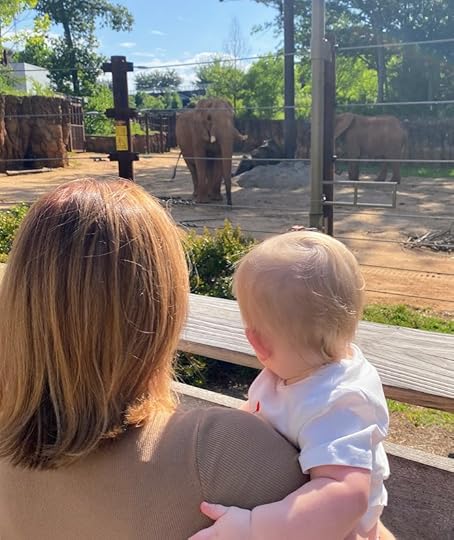
It is fitting that you spent your 1st birthday at Zoo Atlanta, because it was a chance visit to Grant Park in the spring of 1970 that drew me into a 40-year career working with animals in zoos. I met Grandma Karen when I worked at the Louisville Zoo. Your dad was born when I worked at the Toledo Zoo. He spent the 1st ten years of his life in and around that zoo.
So, it was on a hot July morning that we jockeyed for position at the Zoo Atlanta viewing areas. You were suitably impressed with the elephants and giraffes, pointing them out to us and calling them “gogs”. You also patiently watched the gorillas and cautiously petted some goats. But you reserved your most enthusiastic response for the many car-like utility vehicles (“caws”) that cruised the pathways.
I can’t predict much about how your life will unfold, but I do think animals will feature prominently. You share your home with two dogs, Alice and Libby, and I believe “gog” was your first, recognizable word. And a fitting first-word it is. Dogs don’t just live with you. They crawl around the floor with you, they steal your food, lick your face, and give you unconditional love and affection.
A couple of weeks ago, Grandma and I brought Libby and Alice to our house for a few weeks while your backyard is having some work done. Your dad reported that when you came home from daycare, you noticed their absence (a remarkable bit of awareness) by saying “gogs”.
Dogs have also been a part of my life since the day I was born, too. My childhood dogs—Mitsy, Tippy, and Snoopy—were yard dogs that never came inside the house. But in those days children seldom went in the house either, except to eat or sleep. The dogs ran with us, or we ran with them.
Grandma Karen and I shared our home with Simba and Jana for the first fourteen years of our marriage, then Chelsea and Bexley for another twelve years. Now, we are content to have Alice and Libby stay with us on occasion.
I love having dogs around me. They help me understand the deep connection between humans and animals. When I lay my hand on a dog, I feel a sense of calm and wellbeing that defies any rational explanation. Maybe that is why I was drawn to a profession that allowed me to work with animals.
When I wrote my book, Lessons from the Zoo, I included a bonus lesson titled, “Love Your Neighbor”. In it, I explore the spiritual dimension of how we deal with animals and how my faith in God reinforces my love of animals. We humans have a tendency to think of ourselves as separate and above the animals. We treat them as objects to be owned, exploited, and even eaten. But the world is a multispecies community, and we should recognize our spiritual relationship with all living things.
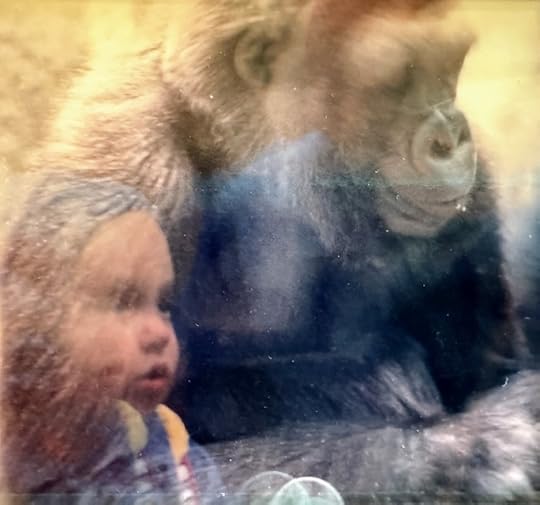 Your dad, Ian Porter and gorilla – Toledo Zoo 1992
Your dad, Ian Porter and gorilla – Toledo Zoo 1992You won’t remember anything about your first trip to the zoo. But that’s okay. I don’t remember anything about my first trip to the zoo, either. Memories, it would seem, are another area where our lives intersect. Your memories are just beginning to build as my memories are fading like the sound of a passing car. That’s why I am trying to write down as much about our lives together as I can. Maybe someday, you’ll look at these musings and remember how much life you have already lived and how deeply you are loved.
In a contest of important figures in your life, I would probably rank a distant 4th right now (maybe 6th if you count your dogs). But I can’t help but feel there is a special bond between us. We’re just a couple of guys—one young and one old—trying to figure out our place in the universe.
So, Happy Birthday buddy. I can’t wait to see what adventures your second year of life will bring us.
Love,
Grandpa
July 4, 2025
Dear Oliver – Happy Days
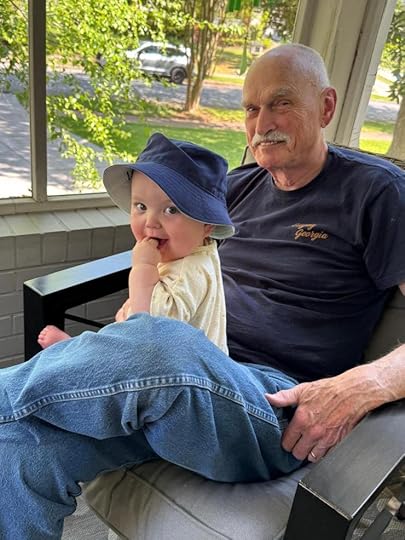
Your 1st year has been a whirlwind of activities, events, and milestones. One of the highlights for me was when Grandma Karen and I traveled to Hawaii with you and your parents in November 2024. We stayed in a condo on the island of Maui where I celebrated my 75th birthday and your mom celebrated her 30th a couple of days later. We spent a few days walking along sandy beaches and enjoying the warm ocean breezes, then drove up to see an inactive volcano at Haleakala National Park. We were shocked at how cold and windy it was at 10,000 feet of elevation. We weren’t dressed for it, but we figured out a way to bundle you up against the cold.
Later, we flew over to the big island of Hawaii and had a lovely few days driving around the lava fields and beaches before flying home. You had a few “melt downs” on the long car rides but generally were very happy the whole time. Traveling with you as a 4-month-old was a pleasure!
In December, I noted to myself that “there is nothing like having a baby fall asleep on your chest. He has a bit of a cold. Oliver’s raspy, snoring breaths are five to my one. He has just started eating solid foods from a spoon. Karen fed him some mashed-up banana with some baby cereal & formula. He’s like a baby bird when he sees the spoon – mouth open, tongue out, lunging forward. But he’s not sure what to do when the food gets in his mouth. He pushes it out with his tongue.”
By the end of February 2025, at just over 7 months of age, you had 2 teeth, you were able to sit up without support and would be crawling soon. You were verbally babbling but not forming actual words yet.
Around this time, it occurred to me that you and I are living in historic times. The world is changing in ways I could have never imagined—and I’ve lived through plenty of changes. During my lifetime, humans have created computers and the internet, landed humans on the surface of the moon, and transplanted a human heart. I wonder about the world you will live in when you are old enough to read this. It will be very different from anything I can imagine.
These days, we seem to be stuck in a period when people with extreme opinions and without humor or compassion are entrenched in their ideas and ready to do battle with each other. Compromise and common sense seem to be in short supply. You, of course, are happily oblivious to all this.
You are a joyful child most of the time and I love it that you smile a lot and laugh, on occasion. I am sorry we didn’t think to make a note of your first laugh because I recently learned that the Navajo people of the American Southwest have a specific tradition around celebrating a baby’s first laugh. At around three months of age, they watch the baby closely for that first real giggle. The person who has the good fortune of eliciting that first laugh is then responsible for throwing a party,
The belief behind the tradition is that when a baby is born, he belongs to two worlds: the spirit world and the physical world. The first laugh is seen as a sign of the baby’s desire to leave the spirit world and permanently join his earthly family. I wish we could have celebrated your first expression of joy as a milestone in your life.
I was fortunate to be raised in a family that shared a lot of laughter. One of my earliest memories of my father was on a road trip to Gainesville, Florida to visit his brother, my Uncle Bobby. I was in the back seat of the car looking over his shoulder (no seat belts or car seats in those days) when a bug hit the windshield glass on the front of the car. My dad turned to me and said, “Do you know what that bug said when he hit the windshield?”
“No,” I replied.
Dad said, “If I had the guts, I’d do that again.”
I thought that was the funniest thing I had ever heard.
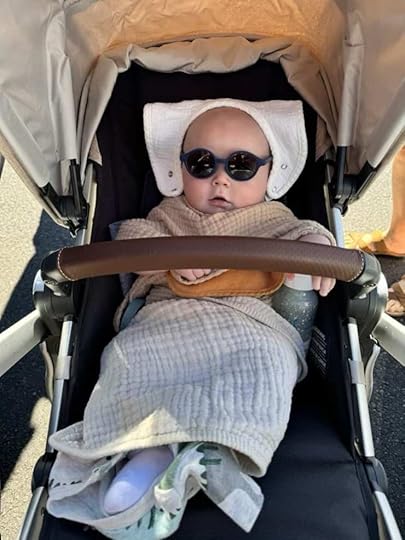 Bundled up at the top of the volcano
Bundled up at the top of the volcanoLife will throw you plenty of challenges, difficulties, and even tragedy. But I hope you will remain positive and find your way back to happiness. A famous person once said, “A day without laughter is a day wasted.”
I am happy and laugh a lot. My mission, as your grandpa, will be to help you laugh, giggle, or smile every day of your life. When you get a little older, I’ll answer important questions for you like: What is worse than finding a worm in your apple? And, How do you get a squirrel to like you?
In the meantime, keep smiling!!
June 28, 2025
Dear Oliver – Introduction
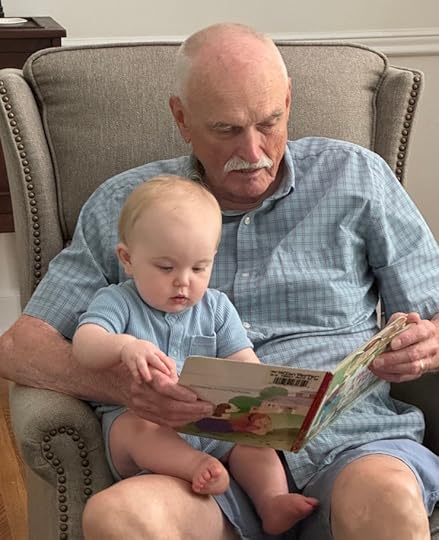
In a couple of weeks, my youngest grandson will celebrate his first birthday. I have other Grands—and I love all of them dearly—but Oliver is the first one I’ve lived near enough to share his life. Karen and I see him often and keep him for the day once a week. I have watched his progress closely and have come to wonder what the world of his future will look like.
When I was his age, cars didn’t have seatbelts and bicycles didn’t come with helmets. We had a small, black and white TV and a telephone on a shelf in the hallway. A terrible world war was a few years in the past and space travel was the stuff of futuristic science fiction.
I certainly don’t long for the “good old days”. I love my life today. But I do wonder what the future holds for someone who was born the year I turned 75. He won’t remember anything from his early years, so I thought I’d write some letters to his future self. His first birthday seems like a good time to begin.
Dear Oliver,
Happy 1st Birthday!
I am surprised at how much this old man enjoys being in your company. I have older grandchildren and great-grandchildren, but they all live in Louisville, Kentucky. I seldom get to see them. You’re the first grandchild I’ve lived near enough to see weekly. Words can’t describe how I feel when you recognize me and break into a smile. Even at a few months of age, you have a great disposition, are very inquisitive, and change from week to week.
I am also amused by some of the parallels during your first year of life and my 75th. For example, your pudgy little fingers struggle to pick up small objects and bits of food. My wrinkled, bony fingers also struggle to function on occasion. My hands shake so badly I am constantly dropping things and can barely get a forkful of food to my mouth. My handwriting has gone from bad to unrecognizable.
Another parallel is that we are both unsteady on our feet. You will soon be learning to walk, and I am forgetting how to. A couple of years ago, when I was in the hospital for hernia surgery, I was given a wrist band that declared I was a “Fall Risk”. It was probably just because of my advanced age. I haven’t fallen yet, but I do wobble on occasion like you.
And, I have been thinking about teeth—because you have teeth coming in and I just had a molar tooth extracted because it broke off. I now have a painful hole in my jaw that will take a few weeks to heal. Your tooth pain is from the upper canines that will soon join your four incisors. Your pain will heal as well, but you will have new teeth to show for it.
I love writing but don’t sell many books. Maybe I’m just not very good at it. I’ve published three nonfiction books, two novels. and recently completed my third (and final) novel—The Muleskinner and The King. Once I get that published, I’ll be content spending my days writing to the future you. But writing this letter to you is a unique experience. In my other writing, I know what the journey of my characters will be, and I have a good idea of how the story will end. As I write these words to the future you though, I have no idea what our journey will look like or how and when it will come to an end. I just know I’m looking forward to spending as much time with you as I can.
I just came across a lovely quote that sums up how I feel about our life together. It comes from the 1997 book by Mitch Albom called Tuesdays With Morrie. Morrie Schwartz is dying, but he says that as long as we can love each other, and remember the feeling of love, we can die without ever really going away. All the love we create is still there. We live on in the hearts of everyone we have touched. Someday, when you’re old enough to read this, you may not remember me. But the love I’m giving you will live on inside your heart and my spirit will be with you for the rest of your life.
I’ll write again next week.
Love,
Grandpa
March 12, 2025
The Dogcatcher and The Fox
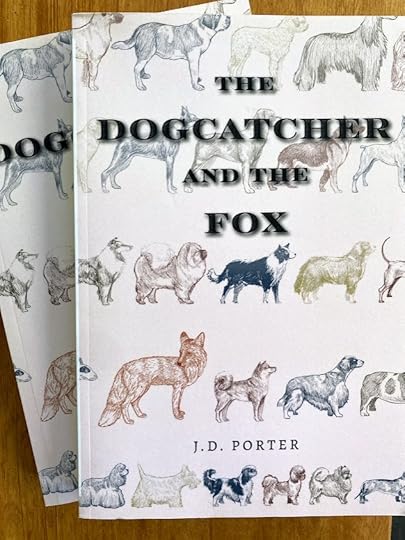
The reviews are in: “The Dogcatcher and The Fox recalls the great social novels of the era, like Henry Blake Fuller’s The Cliffdwellers and the sweeping historical fiction of E. L. Doctorow’s Ragtime.” Ian Morris
According to Windy City Reviews, The Dogcatcher and the Fox is “engaging, entertaining, and enlightening”. It’s 1919 Chicago, and Raven Griffith works at the Animal Welfare Association. Young, gutsy, and determined, Raven faces numerous obstacles in her work, often putting her health and safety at risk as she tries to fulfill her life goal of protecting animals from people who abuse them.
Amazon verified purchase reviews:
“Fantastic book! Very well written.” AND “If you are an animal lover, you will enjoy this book.”
Dogs are disappearing from the streets of 1920 Chicago and Raven Griffith with the Animal Welfare Association is on the case. She is a courageous woman who has reined-in a team of runaway horses, faced down a racist mob, and been kidnapped and shot. But when she assumes the seemingly trivial task of investigating those missing dogs, her adventure really begins.
As a lodger in the lavish home of eccentric widow Katherine Ruebottom, Raven gains a circle of fierce female friends, including Jo Washington, a young woman with a murky past, and Min Lee, the child of a conscripted railroad laborer from China, who is also hiding more than she tells. To solve the mystery of the missing dogs, Raven and her posse team up with a handsome policeman and a gangster known as the Fox. But against the backdrop of murder, corruption, and racial violence, Raven’s cause seems futile. How can this young woman prevail against corrupt cops, an Irish street gang, and a sinister drug company in her pursuit of justice for the animals?
February 21, 2025
The Menagerie, A Zoo Story
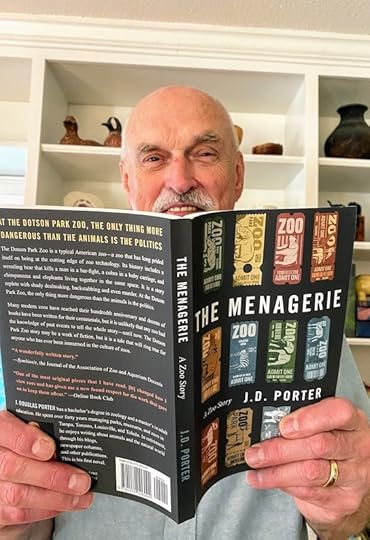
Many American zoos were founded just before the turn of the 20th century when people were looking to get outdoors and escape their increasingly industrialized, urban environments. Today zoos are stronger than ever, as communities invest millions of dollars in their development and upkeep. With 181 million visitors every year, zoos and aquariums clearly resonate with the American people. But zoos are also polarizing influences on contemporary American life, crying out for new forms of understanding as animal rights groups call for their abolition.
Though a work of fiction, the Dotson Park Zoo could be a typical American zoo—a zoo that has long prided itself on being at the cutting edge of zoo technology. Its history includes a wrestling bear that kills a man in a bar-fight, a cobra in a baby carriage, and chimpanzees and elephants living together in the same space. It is a story replete with shady dealmaking, backstabbing and even murder. At the Dotson Park Zoo, the only thing more dangerous than the animals is the politics.
A wonderfully written story. Symbiosis, the Journal of the Association of Zoo and Aquarium Docents
One of the most original pieces that I have read. [It] changed how I view zoos and has given me a newfound respect for the work that goes on to keep them afloat. Online Book Club
Click here to purchase: Bookshop.org
February 8, 2025
Writing about animals – and the people who care for them
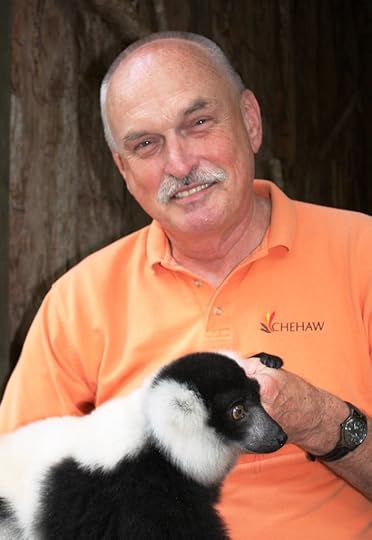
We humans have an uneasy attitude toward animals in zoos. It is an uneasiness that can be seen in the ongoing debate whether zoos are educational and useful or cruel and an outrage. This was pointed out to me in an article in my hometown newspaper over 50 years ago. The journalist who interviewed me as a young zookeeper at Busch Gardens said children adore zoos in a way no adult can. A child’s day at the zoo is an untroubled excursion of entertainment while grownups generally can’t delight in zoos as wholeheartedly. The break occurs the day we go to the zoo and see not just the animals, but also the bars that separate us.
The idea that zoos are intrinsically wrong has troubled me all of my adult life. But we humans haven’t always worried about the “ethics” of keeping animals in captivity. From the earliest days of exploration we have brought animals back from far off lands. Author Glynis Ridley documented an Indian rhino’s travels through Europe in the 1740s in her 2004 book, Clara’s Grand Tour. Then there was Zarafa the giraffe, who crossed the Mediterranean with his head protruding from a hole in the deck of a ship. He was “carefully walked” 550 miles from Marseille, France to Paris in the summer of 1827. Michael Allin shared that story in his 1999 book, Zarafa. But we don’t bring animals from far-off lands anymore and the the zoo business has changed dramatically in the last few decades. I wonder if it has changed enough to make it alright? As a writer, that’s a subject I couldn’t resist exploring in my novel, The Menagerie, A Zoo Story.
Our relationship with dogs is at the other end of the spectrum. While not everyone likes dogs, many people love them enough to let them sleep in the same bed. I always assumed that we had domesticated dogs to guard our campfires, villages and homes. But in writing my memoir, Lessons from the Zoo, I learned that might not be the whole story. Some research suggests that wolves may have domesticated themselves by hanging around human encampments about 15,000 years ago and adapting to our presence over generations. Today, dogs are much more than just companions. Their evolution has continued until we have not only guard dogs and hunting dogs, we also have herding dogs, therapy dogs, war dogs, and more. But humans have not always been kind to canines. It took some extraordinary effort by some extraordinary people to make animal welfare a focus of our communities. My 2nd novel, The Dogcatcher and The Fox, examines the origins of the animal welfare movement in the early days of the 20th Century. The book is dedicated to my own dogs and the unconditional love they offered me: Mitsy & Tippy, who ran with me as a child, a dog named Joy, who eased me into retirement, and the dogs who shared my life in between – Simba & Jana and Chelsea & Bexley.
And then there are the animals that are neither behind bars nor inside our homes—but with whom we share a deep, historic connection. They have long labored along side us plowing our fields, pulling our wagons, and carrying us on their backs. Working animals didn’t enter my orbit until I reached retirement age and began driving a mule wagon at a quail hunting plantation. As a part-time wagon driver, I spent my days holding the reins and staring at the fine, muscular behinds of a pair of mules. Their radar-like ears were usually turned back toward me, listening for a “giddy up” or a “whoa mule.” They pulled me up hills and through mud holes. They went impossibly slow when heading out to hunt in the mornings but returned to the barn at the end of the day at a brisk trot—if not a dead-run. I had a direct relationship with them, although I’m not sure what that relationship was. There was a time when people relied on animal partners to carry us, pull us, and work for us until—as I write in my next novel The Muleskinner and The King—machines largely took their place in the early years of the 20th century.
Each of these human-animal relationships—zoos, dogs, and mules—has evolved dramatically in the last hundred or so years. My three novels are an attempt to explore that evolution.



